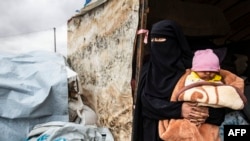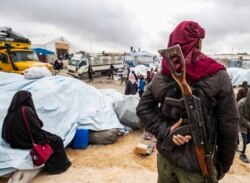The Kurdish-led administration in northeastern Syria is moving ahead with plans to empty the al-Hol displaced persons camp, releasing a second group of families under a plan to ease overcrowding and reduce the stress on security forces in the region.
The Autonomous Administration for North and East Syria (AANES) announced Monday it had released more than 500 people, belonging to 120 families, most of whom are now headed to their former homes in the Deir el-Zour countryside.
Officials said all the families left voluntarily after submitting the necessary documentation, and they expect more families will soon follow.
The mass departure from al-Hol is the second since the AANES and the Syrian Democratic Council (SDC), the civilian arm of the U.S.-backed Syrian Democratic Forces (SDF), announced plans last month to clear out the camp, which at its height was home to more than 70,000 people, including family members and supporters of the Islamic State terror group.
The first group of 289 people, mostly women and children, departed shortly after the announcement, with AANES officials offering assurances that those released "have not been proven involved in hostilities and crimes against Syrians."
Unlike with that first group, though, there are fewer safeguards in place for the Syrians who left al-Hol on Monday. Most notably, local governments and tribal elders have not been required to sponsor or vouch for them.
The release also comes amid reports that the situation in al-Hol has been deteriorating.
A report last week by the pro-SDF Rojava Information Center found that violence in the camp has been increasing, though it placed the blame not on Syrian nationals, but on foreign nationals with links to IS.
"A rise has been detected in escape attempts by foreign ISIS affiliates, with at least three such escape attempts being thwarted [in October]," the report said, using an acronym for the Islamic State.
"Three firearm attacks were also confirmed, resulting in three deaths, all of Iraqi nationals," the report added.
Despite such challenges, the effort to send the estimated 24,000 displaced Syrians back to their homes has met with approval from the United States.
"We see these return and reintegration initiatives for women and the large number of children as positive," a State Department spokesperson told VOA shortly after the plan was first announced. "We have been very clear that the situation at al-Hol, despite the magnificent efforts of the SDC, is unsustainable."
In addition to emptying the al-Hol camp, the SDC and SDF have also been trying to ease the strain on more than a dozen prisons holding almost 20,000 inmates, many connected to IS.
The SDF released more than 600 low-level prisoners, all from Syria, under a general amnesty announced last month.
The sentences of another 250 or so prisoners were cut in half.







